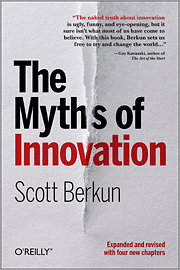The Myths of Innovation, Second Edition, by Scott Berkun (a book report)
 Words are cheap. So says Scott Berkun in The Myths of Innovation,
Second Edition, published by O’Reilly. It’s easy to call yourself, your
product, or your organization innovative, but it takes more than
calling something innovative to make it so. In this book, Berkun
outlines and dispels ten common misconceptions about innovation. The
second edition adds four additional chapters with advice for would-be
innovators and entrepreneurs, moving from theory to practice.
Words are cheap. So says Scott Berkun in The Myths of Innovation,
Second Edition, published by O’Reilly. It’s easy to call yourself, your
product, or your organization innovative, but it takes more than
calling something innovative to make it so. In this book, Berkun
outlines and dispels ten common misconceptions about innovation. The
second edition adds four additional chapters with advice for would-be
innovators and entrepreneurs, moving from theory to practice.
The first ten chapters, carried over from the first edition, each delve into one “myth” commonly believed about innovation. Berkun’s research is fantastic. He breaks down each misconception using examples as we’ve come to know them and the realities behind each innovation. Along the way, we come to learn that many of our romantic notions about how new ideas become indispensable products are, in fact, embellished by history. It’s a fascinating read, especially for anyone who is familiar with the likes of Malcolm Gladwell or Seth Godin. Berkun’s perspective, style, and copious research are at least as thought-provoking as the writings of these other authors.
As I mentioned, Berkun has made the second edition worthwhile by adding four new chapters, building off of the concepts presented in the first ten chapters and giving real-world, no-nonsense advice on how to apply those concepts to the reader’s own ideas. These chapters propose a “simple plan” for becoming someone who could one day be known as an innovator. Note here that simple does not mean easy, as Berkun points out frequently that developing ideas, thinking creatively, pitching your idea to would-be supporters, and staying motivated can be challenging—and the ability to repeatedly rise to those challenges is what separates the innovators from the also-rans. Berkun’s get-to-the-point writing style is perfectly fitted for The Myths of Innovation across the board, but it shines in these chapters. If you’ve read Gladwell and Godin and are ready to move from getting inspired by the stories of others to being the one being written about and inspiring others one day, these chapters provide an excellent launch pad.
For those who are interested in further reading on the topic of innovation, Berkun provides an annotated, prioritized list of additional books that he read during his own research. But be warned—as the author notes, those famous innovators history tells us about did not become well-known by reading about innovation theory. If you’re not ready to put some real effort behind your ideas, they are probably not going to come to fruition.
More information about The Myths of Innovation, Second Edition is available from O’Reilly.
Note: I wrote this review for O’Reilly’s Blogger Review Program. It’s a pretty nice deal: Get a free e-book to read, share a review in your blog, get another free book to read. Sign up for yourself to take advantage of this deal, and watch for more book reports in my blog.
